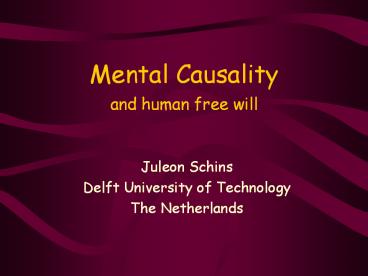Mental Causality and human free will PowerPoint PPT Presentation
Title: Mental Causality and human free will
1
Mental Causalityand human free will
- Juleon Schins
- Delft University of Technology
- The Netherlands
2
Intuitive conditions for free will
- 1. There must exist a personal self capable of
determining originally the future evolution of a
material body
2. This original determination should not
conflict with physical laws
3
Standard argument against free will
Electrodes measuring action respond before
electrodes measuring ones conscious experience
of willing that action
- Criticism how can a neurologist exclude that one
is measuring the conscious experience of having
acted?
4
Classical causality
5
Modern causality
Quantum mechanics marks the end of phenomenic
causality
Straightforward philosophical interpretation of
quantum impredictability causality is (i)
transcendent and (ii) hylemorphic
6
Quantum-hylemorphic causality
material reality
physical laws
choice
7
Positive evidence in favour of a non-material
self, source of mental causality
- The moral judgement
- The intentional judgement
- The mathematical judgement
8
Evolutionary diversification
- Economical policy free market versus government
interference - Political organisation federation versus union,
direct versus indirect elections - Religion no god, one god, many gods
- Philosophy the world exists (not), the world is
(not) knowable
9
The moral judgement
- Every biologically normal human judges that (s)he
has absolute personal rights - This claim of personal rights is verifiably
universal - This claim has no added value for evolutionary
survival - Darwinism (variation and selection are sufficient
principles for the birth and diversification of
all life) is not able to account for the
universality of this claim
10
The mathematical judgement
- Kurt Gödel proved in 1931 that
- (i) derivation (or procedure) and truth judgement
are fundamentally different concepts A ? B - (ii) every consistent axiomatic system contains
true but undecidable statements (not derivable
from the axioms) - Ergo mathematical truth is not an intrinsic
property of axiomatic systems, but a transcendent
one
11
The mathematical judgement
- All humans can (if they wish) understand Gödels
argument - The human mathematical truth judgement is not
processive (deductive) - Deductive causality material causality
physical lawfulness - The human mathematical truth judgement has a
non-material origin
12
The intentional judgement
- First order intentionality the ability to have
intentions - Second order intentionality the ability to
conceive that others have intentions - Third order intentionality the ability to
conceive that others conceive that thirds have
intentions
13
nth order intentionality
- Peter knows that John knows that Angie knows that
Clara knows
that Jack tries to get hold of mums legacy
14
humans
Order of intentionality
?
4
chimpanzees
3
primates
mammals
birds
2
reptiles
amphibians
fish
1
insects
plants
bacteria
700
600
500
400
300
200
100
0
Past time (millions of years)
15
Non-quantitative lawfulness
- The three mentioned judgements (moral,
mathematical, intentional) are not examples of
human behaviour conflicting with physical laws, - but examples of behaviour that cannot be
explained by them
Yet the regularity, the universality displayed by
these examples points to a non-quantitative law,
describing its proper object (by definition
non-material)
16
Conclusion
- We have seen that
- a principle is operative in nature that cannot be
described by quantitative laws - this principle is the causal source of moral,
intentional, and mathematical judgments - Does this prove mental causality? Yes.
- Does mental causality prove free will? No.
- However, it satisfies all the philosophical
conditions for free will

